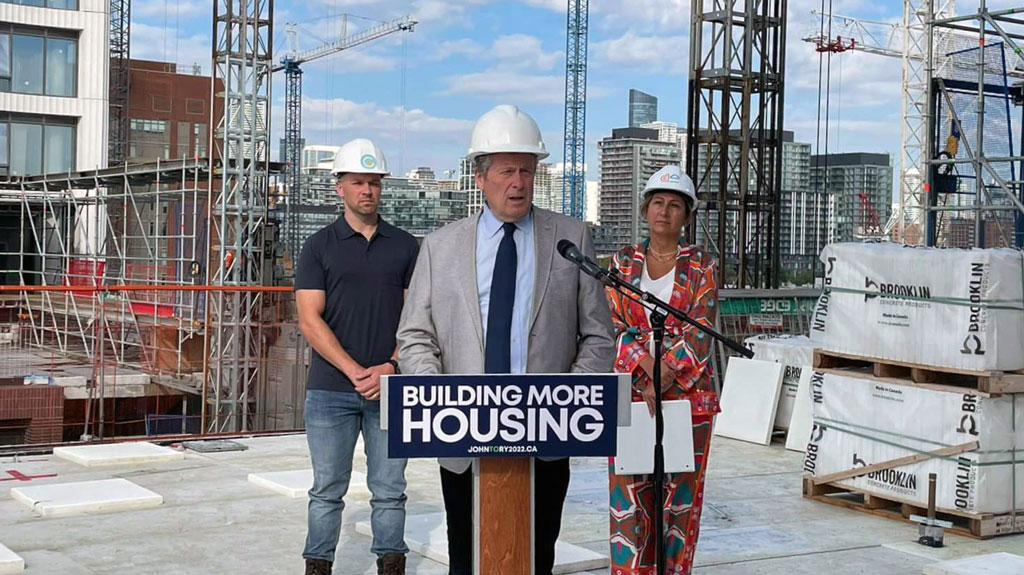The roles of chief planners and city councillors in Toronto and Ottawa could be seriously impaired under Ontario’s new Strong Mayors law, warns a Toronto scholar.
The Strong Mayors, Building Homes Act was passed by the Ontario legislature Sept. 8.
It’s intended to give the mayors of Ontario’s two largest cities more powers to expedite home building, giving them veto powers over bylaws that conflict with provincial priorities, such as building 1.5 million new homes in the province over the next 10 years. A council could override the mayor’s veto with a two-thirds majority vote.
The two mayors also have more powers to hire key municipal staff such as CAOs as a way to prioritize provincial priorities, with statutory positions such as a city clerk exempted.
Myer Siemiatycki, professor emeritus of politics and public administration at Toronto Metropolitan University, has taught courses on municipal government for over 40 years.
On Aug. 29 he addressed a government standing committee taking submissions on the proposed act.
“I like to accentuate the positive,” said Siemiatycki, giving testimony. “Regrettably, I don’t have positives to say about Bill 3. That’s because I don’t think it fulfills its stated objectives — and will create a host of problems.”
Siemiatycki was joined by representatives of the Association of Municipalities of Ontario and the Ontario Professional Planners Institute (OPPI) in offering criticisms of the bill or only qualified support.
They countered the praise that came from such groups as the the Ontario Home Builders’ Association, the Building Industry and Land Development Association and the Residential Construction Council of Ontario (RESCON).
Siemiatycki charged the new legislation is simply a way for the government to deflect blame from its own failure to boost housing supply.
“The province has recognized that this is a very hot and difficult issue,” he said in an interview. “And I think the only reason we have had this legislation introduced is because the province wants to download blame for any housing problems onto municipalities. They don’t want themselves to be seen as somehow responsible for this problem.”
The legislation creates the illusion that mayors and councils are holding up growth and development, Siemiatycki said. While there may be some councils with restrictive attitudes, the province has the tools and the responsibility to address the problem.
“The province should be creating legislation to require inclusionary zoning across the province,” he said. “It shouldn’t be up to mayors to decide to reject majority decisions of elected members of their council.”
The government should also require that a minimum percentage of all new residential construction be affordable, and it should ramp up investment in non-profit rental housing, the surest path to affordable housing, Siemiatycki said.
The bill gives the mayor authority to hire and fire senior city staff, Siemiatycki said, turning neutral, high-quality professionals into personal selections of the mayor.
“The new powers will marginalize the input and the voice of city councillors and by doing that, it’s really harming local residents.”
Meanwhile, the mayor will come under pressure from cabinet and also from builders and developers, who will go straight to the mayor’s office.
“The mayor will be bombarded with appeals from provincial authorities and from builders,” said Siemiatycki.
OPPI executive director Susan Wiggins told the standing committee her association does not oppose the concept of a strong-mayor system for large municipalities in Ontario, given it has been tried and worked in other jurisdictions.
The OPPI gives the legislation “qualified” support, Wiggins said in an interview, with the caveat being that there be a separation between the mayor and the head of the planning department.
Wiggins said it is understood that the chief planner is exempt from those positions the mayor can hire and fire without consulting council.
“We said it can work if the right governance structures are in place so there’s real power for council,” commented Wiggins.
“It wouldn’t be a good concept if the planners were not an exempt profession.”
RESCON president Richard Lyall commented in a statement that the Strong Mayors act will help speed up the municipal decision-making process.
“Many of the systemic barriers to producing more housing lie within municipal zoning restrictions, red tape and substandard departmental programs and practices that need to be modernized and digitized,” said Lyall.
“We are in a crisis as there is not nearly enough housing supply to keep up with demand. Bold action is needed to help mayors deal with systemic bottlenecks in the system and this legislation will help to accomplish that.”
Follow the author on Twitter @DonWall_DCN










Recent Comments
comments for this post are closed